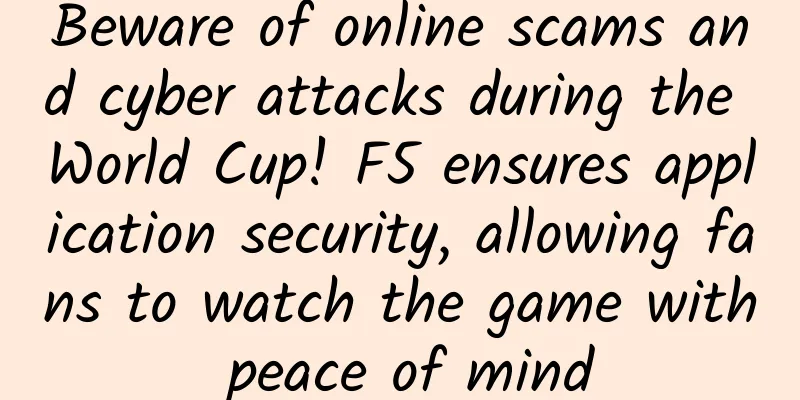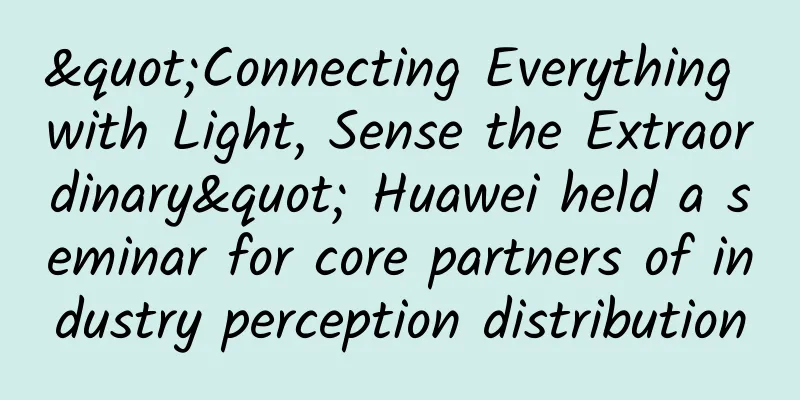Beware of online scams and cyber attacks during the World Cup! F5 ensures application security, allowing fans to watch the game with peace of mind

|
It is well known that the holiday shopping period and Thanksgiving season are also often the carnival season for scammers. During this period, phishing, ransomware and other cyber attacks will be more frequent than usual. In fact, the situation may be even worse this year, as one of the world's largest sporting events is taking place in Qatar in 2022. Especially now that we have reached the semi-final stage and the top four have been determined, people's emotions will undoubtedly be high, and online shopping activities will increase greatly. To make matters worse, potential attackers have far more options for social engineering attacks than Argentina's starting lineup, and they are cleverly tricking people into opening virus-laden emails, clicking on links to fake or rogue websites, or downloading malware-laden attachments. This is not breaking news. Believe it or not, scams and cyberattacks targeting the 2022 World Cup actually began more than a year ago. For example, phishing emails claiming to be from FIFA officials have been touting VIP seats and free access to hospitality events related to the tournament and participating countries. All the recipient has to do is click on a website link that asks for payment or bank information. After that, their device will be infected with malware capable of stealing credentials and more. In addition, when they enter their details on the fake website, this information will be stolen, leaked, and sold on the dark web, most likely to be purchased illegally by someone else. There are also fake World Cup websites that look very much like the official ones, as the URLs look as real as the official FIFA URLs, or at least very close. Most of the websites have valid certificates and even have the browser's security icon to show that the website is authenticated. However, these websites are loaded with malware that can infiltrate visitors' devices and apps. Some fake websites also have fake stores where people can buy tickets to the World Cup that don't exist. Imagine if you arrived in Qatar and found out that you couldn't watch the games! On top of that, your bank details will soon be used to make purchases without your authorization, or sold to someone else, a method that has been used to defraud official merchandise. Then there's the crypto factor, with the most common scams being fake World Cup cryptocurrencies and non-fungible tokens (NFTs). Don’t forget the ransomware threat, which is massive and threatens the vast ecosystem of logistics and services that need to run smoothly. In other words, now is a prime time for cybercriminals to launch disruptive actions and make quick profits. The potential culprits could be some disgruntled individuals or hackers who might want to embarrass the host country and damage its reputation. But there's more to it than that, with FIFA predicting that up to 5 billion people will watch the World Cup worldwide. So there are more ways to watch the World Cup matches than ever before, with streaming services accessible on any device, even company-issued ones. However, using such devices to watch your favorite team's matches can pose a problem. According to a survey by market research company Opinium, nearly 15% of British football fans said they would watch England's first match outside of the workplace. Nearly 20% of fans said their employer would broadcast the match or allow them to watch it during working hours. Nearly 15% said their company did not allow watching the match at work, but they would go to watch it anyway. The big question is, if everyone is watching on a company device, or from the comfort of their home office, are they accessing a secure website or streaming service? What are the dangers of watching the game on a company device? And if an attack were to occur, are the organizations prepared to respond? Fortunately, there are ways to strengthen your defenses. For example, by implementing dynamic traffic steering through solutions such as F5 BIG-IP SSL Orchestrator (security-as-a-service scheduling engine), companies don’t have to worry about how everyone watches the World Cup and what network security risks it brings. The technology has earned the title of "MVP" by centralizing the decryption and re-encryption of traffic. It ensures that decrypted traffic is routed to the appropriate set of security solutions within the existing security stack, maximizing the efficiency and security of the infrastructure. Currently, more than 90% of network traffic is encrypted, and attackers use encrypted traffic to mask and embed malicious payloads. Visibility is critical, but so is orchestrating the traffic that needs to be inspected and ensuring the right tools for the job are used. In addition, enterprises can create dynamic service chains to ensure that the security solution used to inspect the type of traffic is actually able to do so. This means that no security solution will be unable to handle too much traffic, which will bypass security inspections and bring about cyberattacks, data breaches or ransomware threats. F5 BIG-IP SSL Orchestrator can also create dynamic service chains that require little to no security inspection and no decryption. This can meet local government regulations such as the EU General Data Protection Regulation (GDPR), which require that certain types of private traffic (such as traffic related to personal finance and health) not be decrypted. In terms of deployment, BIG-IP SSL Orchestrator can be deployed in a variety of environments, including on-premises, as a local virtual appliance through a private cloud, or integrated into a public cloud environment. Other related tactical initiatives include the ability to integrate BIG-IP SSL Orchestrator with F5 Secure Web Gateway Services, a subscription-based solution that blocks users from accessing dangerous websites and applications. F5 Secure Web Gateway Services is regularly updated to prevent malicious URLs and can restrict the types of websites users can access. So why should we worry about what websites football fans visit? Cyber criminals are growing in numbers but with increased awareness and some smart deployment of technology, we can definitely stop their attacks on football fans! |
<<: What are some use cases for network automation?
Recommend
5G economy has arrived, and there is no "hidden corner" for industrial innovation
The summer of 2020 was a special experience for t...
What are the main application scenarios of 5G?
5G networks offer greater bandwidth than previous...
An article reviews the top 10 wireless network technologies that connect tens of billions of terminals
With the development of the Internet industry, pe...
Huawei Intelligent Computing releases FusionServer Pro intelligent server to help data centers evolve towards intelligence
[51CTO.com original article] Recently, Huawei'...
Introduce the commonly used encoders and decoders in Netty
[[359182]] The previous article introduced Netty ...
Microcables – an excellent solution for denser and faster fiber deployments
The telecommunications industry is undergoing a m...
Good news! 5G is so important, China Mobile has made a great contribution
When it comes to 5G networks, everyone should be ...
The pace of 5G commercialization is accelerating, and smart hardware is experiencing rapid development
As another technological concept after smartphone...
[11.11] iOVZ: 60% off monthly payment/50% off annual payment for all VPS/dedicated servers, Hong Kong/Korea VPS monthly payment starts from 36 yuan
iOVZ Cloud has launched a promotion during the 20...
The era of ubiquitous smart devices and edge computing is coming
Edge computing is on the rise. Are you ready for ...
Dwidc: Hubei 400G high-defense VPS starts at 12 yuan per month, high-defense independent server starts at 385 yuan per month
dwidc (Dawang Data) is the site of Shaanxi Securi...
Latest report: Is 5G private network a hero or a monster?
Whose product is 5G private network? A new report...
Global 5G commercial networks have reached 169 continents and are now covered
[[407907]] According to the latest report from GS...
Alibaba Cloud Lightweight Server Upgrade: Starting from RMB 24 per month in Hong Kong/Singapore, 1GB/40GB/1TB (30M bandwidth)
A few days ago, I shared information about Tencen...
Where does the strength of 5G factories that “take over” 5G+Industrial Internet come from?
In order to accelerate the industry's quality...









